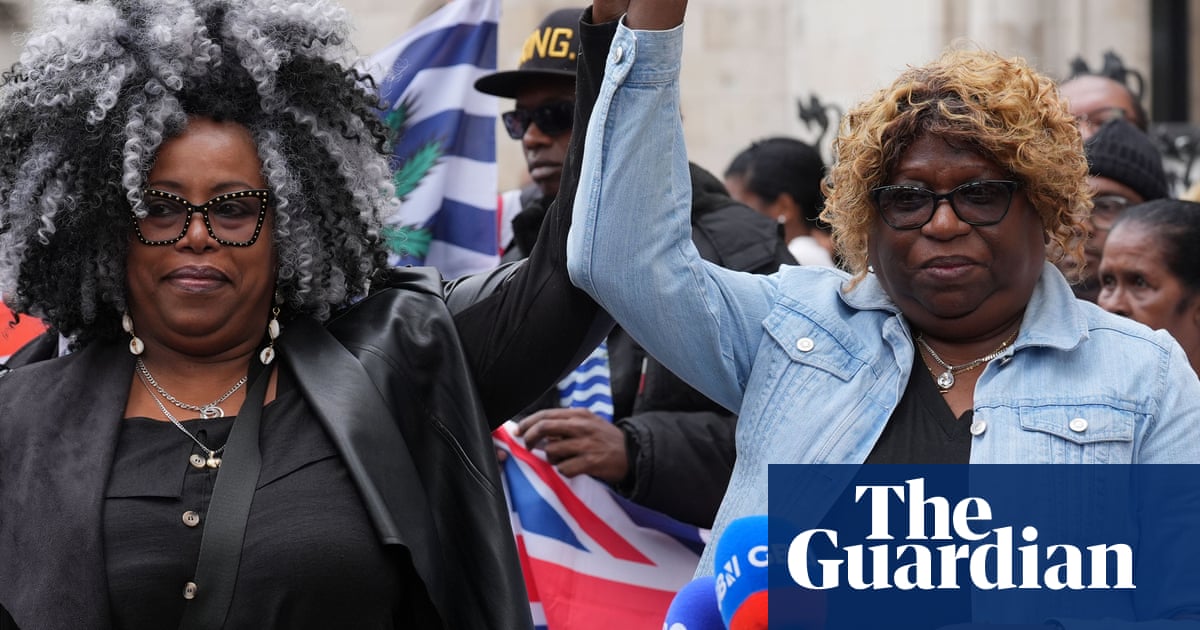Two women who brought an 11th-hour legal challenge to try to stop the UK transferring sovereignty of theChagos Islandsto Mauritius have accused the government of betrayal.
British Chagossians Bertrice Pompe, 54, and Bernadette Dugasse, 68, who were both born on the largest of the islands, Diego Garcia, vowed to keep fighting to try to realise their dream of returning to their place of birth.
They obtained a high court injunction in the early hours of Thursday morning preventing the UK government from signing the deal with Mauritius. But later that day, another judge discharged the injunction andthe agreement to hand over Britain’s last African colony was sealed.
While much of the fallout has focused on the cost to the UK of leasing back Diego Garcia, which is home to a UK-US airbase, and perceived security threats from Mauritius’s relationship with China, many Chagossians feel sidelined.
Chief among their concerns is that Diego Garcia is exempted from the right of return for Chagossians contained in the deal and that the Mauritius government will not do right by them.
Dugasse, who was two-and-a-half when her family was forced to move to Seychelles, said on Friday that she was heartbroken. “I don’t know how to put it because the night before we won, and in the morning we lost – I’ve been betrayed by the British government,” she said.
“I will have to keep on fighting the British government till they accept for me to settle there [on Diego Garcia]. Do I know if I’ll be able to be around to keep on fighting? I’m getting older and older and I’m losing my strength so I don’t think I can make it for very long.”
The presence of the military base was the reason the UK severed the Chagos Islands – renaming it the British Indian Ocean Territory – from the rest ofMauritius, when it granted the latter independence in 1968. The British forcibly displaced up to 2,000 people in what has been described as a crime against humanity and one of the most shameful episodes of postwar colonialism.
Sign up toHeadlines UK
Get the day’s headlines and highlights emailed direct to you every morning
after newsletter promotion
An internal Foreign Office memo notoriouslybelittled Chagossiansas “a few Tarzans and Man Fridays” and Pompe, just six months old when her family was expelled, referred to this as she explained how the UK’s current actions were exacerbating its past transgressions.
She said: “We’ve been ignored, we’ve been invisible, we don’t exist. They don’t even mention us. When they expelled us, everything was hidden [as if] there were no human beings on the island, just some Man Fridays. And they’re not saying it [now], they’re not pronouncing the [same] words, but by their actions they’re doing the same thing. We’re being scammed over and over again.”
Given their historic treatment by the British, it might seem strange that the legal challenge sought to keep the islands under British control, but the women explained that it was intended as a temporary arrangement.
Dugasse said it would be “for the time being, until we are able to manage our island by ourselves”. She elaborated, likening the deal to going “out of the frying pan, into the fire”, and added: “Like my grandparents used to say: ‘Better the devil you know than the devil you don’t know.’”
Of the Chagossians in Mauritius, many of whom support the deal, she said: “They forgot that in the past they were campaigning against the Mauritian government for dumping them in rough houses, dirty places.”
Pompe and Dugasse pledged to continue the fight by urging MPs to vote against the deal in parliament and also through the courts. “I’m still feeling hopeful,” said Pompe. “[Thursday] was a little bit of a disappointment, but after that we’ve had so much support, especially from other Chagossian groups.
“I’m going to keep working with my lawyers, and we’re going to bring another case. So it’s not over until the fat lady sings – and that’s me.”
The government made no reference to the Chagossiansin its press releaseon Thursday. It described the agreement as a “legal necessity”, giveninternational court rulingswhich said it should return the islands to Mauritius, and said it had secured the future of the “strategically critical” Diego Garcia base.
